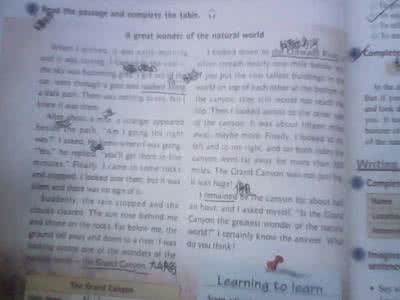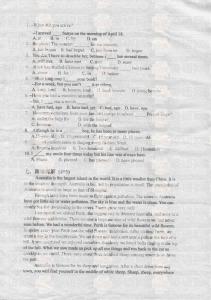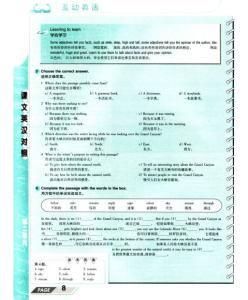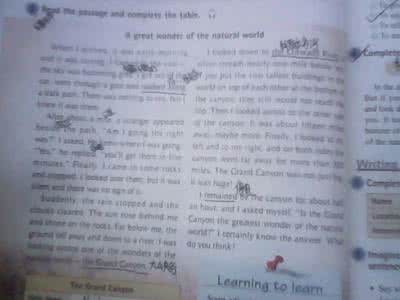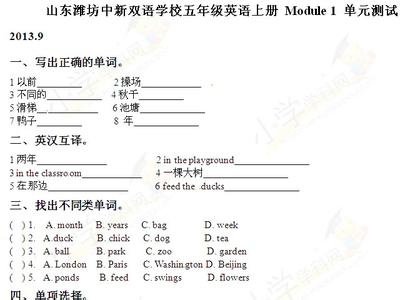在课余时间做好每份英语练习题,就是对英语知识的一个学习和巩固的过程。那么,在考前,你的知识巩固了吗?让我们来做一套试题卷吧!下面是小编整理的外研版初三上册英语Module 4练习试题以供大家阅读。
外研版初三上册英语Module 4练习试题
Ⅰ. 词汇(共10分,每小题1分)
A) 根据句意及所给汉语提示写出句中所缺单词。
1. The train now standing at ________(站台) 1 is for Nanjing.
2. Please ________(关上) the door after you.
3. I remember I ________(锁) the door when I left.
4. The telephone never stopped ________(发出铃声) this morning.
5. There are more than 140 ________(乘客) on the plane.
B) 根据语境从方框中选出恰当的单词填空,有的需要变换形式,每词限用一次。
address, actually, burn, cup, task
6. Would you like a(n) ________ of tea or coffee?
7. Can you smell something ________ in the kitchen?
8. What’s your name and ________?
9. I’m not a student. I’m a nurse, ________.
10. Our first ________ is to cook dinner for ourselves.
Ⅱ. 单项选择(共15分,每小题1分)
从各题后所给的四个选项中选择可以填入空白处的最佳答案。
( )11. Susan is good _______ English writing. She often helps me _______ it.
A. for; with B. for; in
C. at; to D. at; with
( )12. We found _______ so bad at the maths competition.
A. us B. our
C. ours D. ourselves
( )13. The girl is more active than _______ else in her class.
A. anything B. something
C. anybody D. somebody
( )14. _______ it rained heavily yesterday, my mother went out to go shopping.
A. Although B. So
C. If D. But
( )15. The manager gave the new _______ to move the machines to another place before 6:00 pm.
A. form B. dream
C. order D. situation
( )16. The streets were almost _______. There were few people and little traffic.
A. full B. empty
C. big D. small
( )17. She’s bored. We’d better _______ her alone.
A. leave B. expect
C. send D. treat
( )18. The man is _______ old _______ he can’t take good care of himself.
A. such; that B. so; that
C. too; to D. enough; to
( )19. Mike will have a month’s holiday. He is about _______ abroad with his family.
A. travel B. travelled
C. travelling D. to travel
( )20. I’m looking forward to visiting the new lab. I believe my wish will _______.
A. warm up B. hurry up
C. come true D. come out
( )21. It’s time to _______ the TV and go to bed.
A. turn on B. turn off
C. turn down D. turn up
( )22. Miss Smith told us we must _______ the paper before the class was over.
A. depend on B. hand in
C. take up D. take away
( )23. Mike made a mess of his room. His mother asked him _______.
A. tidy it up B. tidy them up
C. to tidy it up D. to tide them up
( )24. —I’m sorry that I _______ you this morning.
—Never mind.
A. shouted at B. shout at
C. will shout at D. am shouting at
( )25. —Tim went to Sanya with his parents during the last summer holidays.
—__ _____. And we met there.
A. So I do B. So do I
C. So I did D. So did I
Ⅲ. 完形填空(共10分,每小题1分)
先通读下面短文,掌握其大意,然后从 A、B、C、D四个选项中选择可以填入空白处的最佳答案。
Ask any student which subject he or she hates most. 9 out of 10 students will answer “ 26 ”. No matter which country you live in, no matter which grade you are in, you may not have to study art, geography or Chinese, 27 you must learn maths. Why is that? Why do so many students hate maths, and yet have to learn it at school?
Jenny Sanders, a high school student from California, 28 , “What good do we get from learning maths? We can use computers to compute numbers. I think learning maths at school is a waste of 29 .”
However, there is much more to maths than just learning to compute. 30 , maths is not so much about calculation (计算). Instead, it is more about learning to think logically (有逻辑性地) and 31 problems. Of course, Jenny is 32 that we can use computers to compute numbers, but how could we even know 33 to use the computer if we can’t think logically? Computers are only tools when we solve problems.
For example, 34 you must make dinner for 100 guests. How should you divide your resources (分配资源) so that you can 35 the job well? In situations like this, the ability to think logically will get you to a good answer and solve your problem.
( )26. A. English B. history
C. geography D. maths
( )27. A. but B. so
C. or D. and
( )28. A. advises B. asks
C. answers D. explains
( )29. A. food B. money
C. time D. water
( )30. A. For example B. In fact
C. At first D. As a result
( )31. A. forgetting B. knowing
C. finding D. solving
( )32. A. surprised B. excited
C. sure D. right
( )33. A. what B. where
C. how D. when
( )34. A. imagine B. remember
C. allow D. trust
( )35. A. finish B. make
C. get D. take
Ⅳ. 情景交际(共5分,每小题1分)
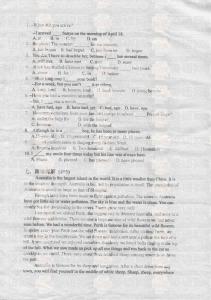
根据对话内容从方框中选出能填入空白处的最佳选项补全对话,其中有两项多余。
A: Hello, Uncle David!
B: Hello, Paul! (36)________ You look worried and unhappy
A: (37)________ I really need your help.
B: What do you mean?
A: (38)________ But I have had more and more homework to do since I was in Grade Nine. My parents don’t allow me to play basketball.
B: Maybe your parents are right. (39)________
A: I see. I do well in all my lessons and I think I should be allowed to do the things I’m interested in.
B: OK. (40)________
A: Thank you, Uncle David. It’s very kind of you.
A. Work must come first.
B. I’ll talk with your parents about the problem .
C. My parents allow me to play basketball.
D. What’s wrong with you?
E. Well, the problem is that I love basketball.
F. I have a problem.
G. You can ask your parents to buy you a basketball.
 爱华网
爱华网